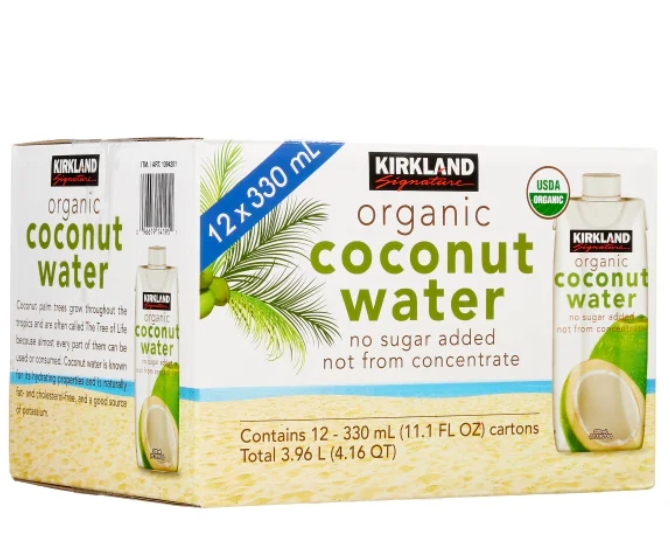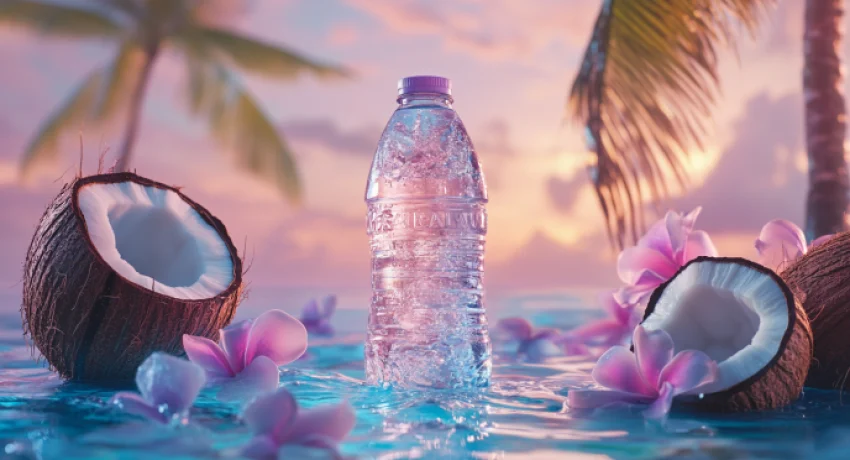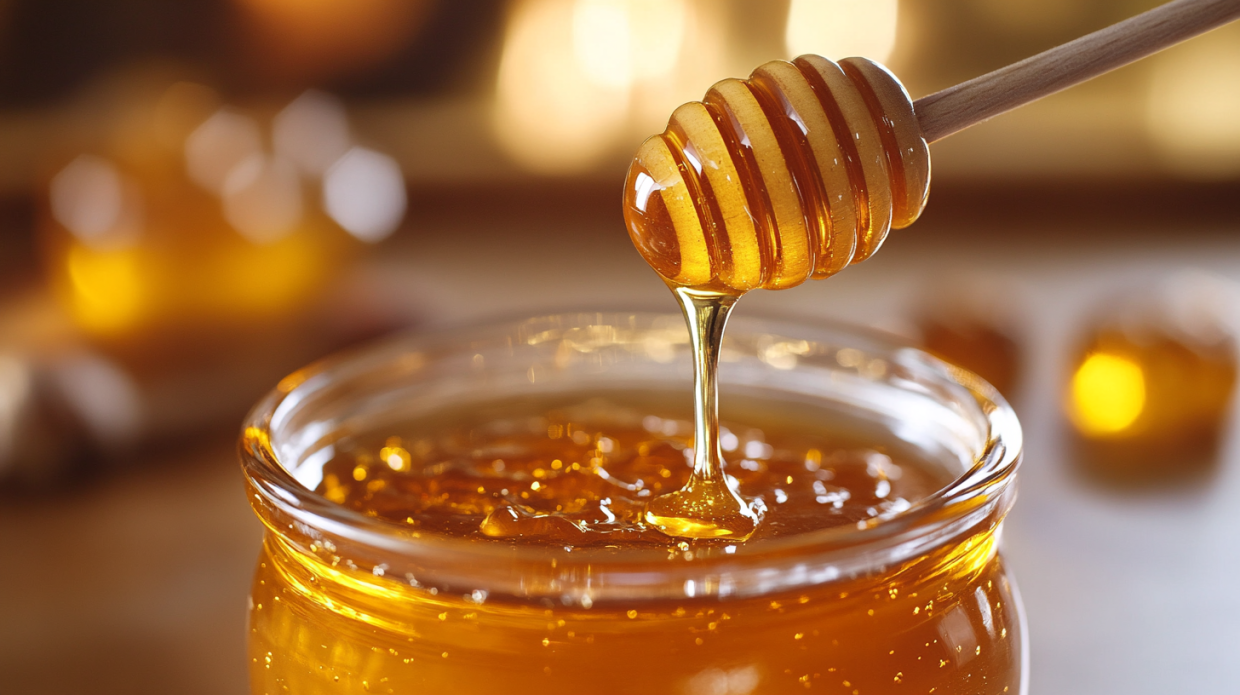
Kirkland Signature, Organic Coconut Water, 11.1 fl oz, 12-count
- Kosher
- USDA Organic
- No Sugar Added
- Not from Concentrate
- 100% Juice:
Discovering Nature’s Perfect Refreshment in the Most Unexpected Place
In a world overflowing with trendy beverages promising everything from enhanced focus to eternal youth, there’s something refreshingly honest about coconut water. It’s nature’s sports drink, unchanged for millennia. But not all coconut waters are created equal, and one brand has quietly built a dedicated following while flying under the radar of mainstream marketing hype. Today, we’re diving deep into the tropical world of Kirkland Coconut Water—the warehouse club gem that’s becoming the secret weapon of savvy shoppers and health enthusiasts alike.
As someone who’s tried virtually every coconut water brand on the market (and spent a small fortune doing so), I’ve developed quite the discerning palate for this tropical elixir. When I first spotted those distinctive Kirkland Signature packages stacked in Costco’s beverage aisle, skepticism was my first reaction. Could a store brand really compete with the premium coconut waters I’d grown accustomed to? The answer surprised me—and might just change your hydration game forever.
What Exactly Is Kirkland Coconut Water?
Kirkland Coconut Water is Costco’s private label version of one of nature’s most perfect hydration solutions—the clear liquid found inside young, green coconuts. Unlike many competitors that add sweeteners, preservatives, or “natural flavors,” Kirkland’s offering is refreshingly straightforward: 100% pure coconut water.
For the uninitiated, coconut water isn’t the same as coconut milk. While coconut milk is made by blending the white flesh of mature coconuts with water, coconut water is the naturally occurring clear liquid inside young coconuts. It’s harvested when the coconuts are still green, typically between 5-7 months of growth, when the water content is highest and the flavor is at its sweet spot.
The Kirkland version comes from coconuts harvested at their peak ripeness, when the natural sugars and electrolyte profile are optimally balanced. This isn’t just marketing speak—the timing of coconut harvest significantly impacts flavor, sweetness, and nutritional content.
The Costco Connection: Where to Find Your Coconut Fix
As the name suggests, Kirkland Coconut Water is exclusively available at Costco warehouse clubs. This exclusivity is actually part of its appeal—Costco’s tremendous buying power and efficient supply chain allow them to offer premium products at prices that would be unsustainable for smaller retailers.
You’ll find Kirkland Coconut Water prominently displayed in the beverage section of most Costco locations. The product tends to maintain consistent placement year-round, unlike some seasonal items that come and go. For Costco members who prefer online shopping, it’s also available through Costco.com and their same-day delivery service in partnership with Instacart (though availability varies by location).
The warehouse-exclusive nature of this product creates an interesting dynamic—it’s become something of a cult favorite among Costco members, who often stock up during their regular warehouse runs. Many report that family members or roommates will specifically request “the Costco coconut water” when making shopping lists.
Price Point: The Value Proposition
Perhaps the most compelling aspect of Kirkland Coconut Water is its remarkable value proposition. A typical package contains twelve 11.1 fluid ounce containers, priced between $12.99-$14.99 depending on location and season. This breaks down to approximately $1.08-$1.25 per container.
To put this in perspective, premium coconut water brands like Harmless Harvest or Vita Coco typically retail between $2.50-$4.00 for a similar size container. This means Kirkland’s offering represents savings of 50-70% compared to leading national brands.
This dramatic price difference raises an obvious question: is there a corresponding difference in quality? This brings us to one of the most surprising aspects of Kirkland Coconut Water…
Pure as the Driven Coconut: Ingredients & Purity
One of the first things I check when evaluating any coconut water is the ingredients list. Many brands include additives like added sugar, “natural flavors” (which can mean almost anything), preservatives, or vitamin fortifications that can alter the taste and nutritional profile.
Kirkland Coconut Water’s ingredients list is refreshingly simple: 100% coconut water. No added sugar, no preservatives, no flavor enhancers. This purity is increasingly rare in the commercial beverage market, where even “natural” products often contain additions to standardize flavor or extend shelf life.
The 100% pure formulation means you’re getting coconut water exactly as nature intended—complete with its natural electrolyte profile, modest sugar content, and distinctive tropical flavor notes that vary slightly from batch to batch, just as they would if you were drinking directly from coconuts on a beach.
The Sugar Question: Naturally Sweet, Not Added
A common concern among health-conscious consumers is sugar content. Here’s the good news: Kirkland Coconut Water contains no added sugars whatsoever. The sweetness you taste comes entirely from the natural sugars present in coconut water.
Each 11.1 oz container contains approximately 11-13 grams of naturally occurring sugar, depending on the specific batch and coconut ripeness. This is comparable to other pure coconut waters on the market and significantly less than most fruit juices or flavored beverages.
For context, the same size serving of orange juice typically contains 22-24 grams of sugar, while a standard soda might contain 33-39 grams. Even many so-called “health drinks” contain more sugar than pure coconut water.
The type of sugar matters too. Coconut water contains a mix of glucose, fructose, and sucrose in a naturally occurring ratio that the body processes differently than the high-fructose corn syrup found in many commercial beverages.
Ingredient Deep Dive: What’s Really in That Carton?
While the ingredients list is impressively brief—just coconut water—there’s more complexity beneath the surface. Coconut water naturally contains a remarkable array of nutrients:
- Potassium: One of coconut water’s standout features is its high potassium content, with approximately 470mg per serving (about 10% of daily needs)
- Magnesium: A crucial electrolyte that supports muscle function
- Calcium: Present in modest amounts, supporting bone health
- Sodium: Naturally occurring in levels that help with hydration
- Phosphorus: An essential mineral for energy production and bone health
- Vitamin C: Present in small but meaningful amounts
- B vitamins: Including B1, B2, B3, B5, B6, and B9 in trace amounts
This natural nutrient profile makes coconut water particularly effective for hydration—it’s essentially a ready-made electrolyte drink created by nature rather than formulated in a laboratory.
The Organic Question
One area where Kirkland Coconut Water differs from some premium competitors is organic certification. Kirkland’s coconut water is not certified organic, which may be important to some consumers.
However, coconuts generally require fewer pesticides than many other crops due to their thick exterior husk that protects the water inside. The coconut palm is also naturally resistant to many pests and diseases, requiring less chemical intervention than many fruit crops.
For those specifically seeking organic options, brands like Harmless Harvest offer certified organic coconut water, though typically at 2-3 times the price of Kirkland’s product.
Brand Battle: How Does Kirkland Compare to Premium Brands?
The coconut water market has become increasingly crowded over the past decade, with brands like Vita Coco, Zico, Harmless Harvest, and C2O dominating the premium space. How does Kirkland’s version stack up against these established players?
In blind taste tests I’ve conducted with friends (yes, I’m that person who turns gatherings into impromptu product evaluations), Kirkland Coconut Water consistently performs remarkably well. Most tasters rank it above mass-market leaders like Vita Coco and Zico, describing it as “fresher tasting” and “less processed.”
When compared to ultra-premium options like Harmless Harvest (which uses a distinctive high-pressure processing method), opinions tend to split based on personal preference. Some prefer Harmless Harvest’s distinctive pink hue and intense flavor profile, while others find Kirkland’s more subtle approach more refreshing and versatile.
The most consistent feedback compares Kirkland favorably to Vita Coco, often considered the market leader, with many noting that Kirkland tastes “cleaner” and “less processed” while costing significantly less.
Hydration Station: Why Coconut Water Works
Kirkland Coconut Water shines brightest when considered as a hydration solution. But what makes coconut water particularly effective for rehydration?
The secret lies in its electrolyte profile, which closely resembles the human body’s own electrolyte balance. When we sweat, we lose not just water but crucial minerals like potassium, sodium, and magnesium that maintain proper fluid balance and muscle function.
Coconut water naturally contains these electrolytes in proportions that facilitate rapid absorption. Studies have shown that coconut water can be as effective as sports drinks for rehydration after moderate exercise, but without the artificial ingredients.
The potassium content is particularly noteworthy—Kirkland Coconut Water contains more potassium per serving than a banana, making it an excellent choice for replenishing this crucial electrolyte lost during exercise or illness.
Nutritional Breakdown: What’s in the Numbers
For the nutrition-conscious, here’s a detailed breakdown of what you’ll find in a typical 11.1 oz container of Kirkland Coconut Water:
- Calories: 60
- Total Fat: 0g
- Sodium: 45mg (2% DV)
- Potassium: 470mg (10% DV)
- Total Carbohydrates: 15g
- Dietary Fiber: 0g
- Sugars: 12g (all naturally occurring)
- Protein: 0g
- Calcium: 4% DV
- Magnesium: 4% DV
- Phosphorus: 2% DV
This nutritional profile makes Kirkland Coconut Water an excellent low-calorie alternative to sports drinks, which typically contain more calories, artificial ingredients, and often higher sodium levels.
Electrolyte Excellence: Nature’s Sports Drink
The electrolyte content of Kirkland Coconut Water deserves special attention, as it’s perhaps the product’s most valuable feature from a functional perspective.
Electrolytes are minerals that carry an electric charge when dissolved in body fluids. They’re essential for nerve and muscle function, maintaining proper hydration, regulating blood pH, and rebuilding damaged tissue.
Coconut water naturally contains five key electrolytes that our bodies need:
- Potassium (the star player in coconut water)
- Sodium (present in lower amounts than commercial sports drinks)
- Magnesium
- Calcium
- Phosphorus
This natural electrolyte profile is what led early proponents to call coconut water “nature’s sports drink.” While commercial sports drinks are formulated in laboratories to achieve specific electrolyte ratios, coconut water offers a naturally occurring alternative that many find easier to digest.
For moderate exercise lasting under 90 minutes, Kirkland Coconut Water provides adequate electrolyte replacement without the artificial colors, flavors, and excessive sugars found in many sports beverages.
Dietary Considerations: Gluten-Free and More
Good news for those with dietary restrictions—Kirkland Coconut Water is naturally gluten-free. Since it contains only coconut water with no additives, it’s suitable for those with celiac disease or gluten sensitivity.
It’s also:
- Dairy-free
- Vegan
- Fat-free
- Cholesterol-free
- Low in sodium (compared to sports drinks)
These qualities make it an excellent choice for people following various dietary protocols who still need effective hydration options.
Tropical Origins: Sourcing Kirkland’s Coconut Water
Kirkland sources their coconuts primarily from Southeast Asia, with Thailand and the Philippines being the main growing regions. These countries have ideal growing conditions for coconuts, with the right combination of rainfall, humidity, and temperature to produce coconuts with optimal water content and flavor.
The coconut palms grow in coastal regions, where they naturally thrive in sandy soil and benefit from sea spray. Unlike many commercial crops, coconut palms require minimal intervention to produce high-quality fruit year after year.
After harvesting, the young coconuts are processed quickly to preserve freshness. The water is extracted, minimally processed using ultra-high temperature (UHT) pasteurization to ensure food safety without significantly altering the flavor, and then packaged in the distinctive Kirkland containers.
Packaging Particulars: Size, Storage, and Sustainability
Kirkland Coconut Water comes in a 12-pack of 11.1 fluid ounce (330ml) Tetra Pak containers. This packaging format offers several advantages:
- The aseptic Tetra Pak technology allows the product to be shelf-stable without refrigeration until opening
- The rectangular packages stack efficiently, reducing shipping costs and environmental impact
- The containers protect the coconut water from light exposure, which can degrade quality
From a sustainability perspective, Tetra Pak containers are generally considered more eco-friendly than plastic bottles, though not as sustainable as glass. They’re lightweight (reducing transportation emissions) and recyclable in many municipalities, though recycling availability varies by location.
The Reviews Are In: What People Are Saying
Kirkland Coconut Water has developed something of a cult following among Costco shoppers, with reviews consistently highlighting several key aspects:
- Value: The most frequently mentioned positive attribute is the exceptional price-to-quality ratio
- Taste: Many reviewers compare it favorably to premium brands costing twice as much
- Purity: Health-conscious consumers appreciate the lack of additives
- Consistency: Unlike some brands that vary significantly batch-to-batch, Kirkland maintains reliable quality
Online reviews across platforms like Reddit, Twitter, and various health forums reveal a particularly dedicated fan base. One Reddit thread titled “Kirkland Coconut Water is the best deal in hydration” garnered hundreds of comments from enthusiastic users sharing their experiences.
Professional reviews have been similarly positive. Consumer Reports included Kirkland Coconut Water in their evaluation of coconut waters and rated it highly for both taste and value.
GMO Status: Natural or Engineered?
For those concerned about genetically modified organisms, there’s good news: Kirkland Coconut Water is non-GMO. This isn’t explicitly stated on the packaging (unlike some brands that prominently feature non-GMO certification), but coconut palms used for commercial production are not genetically modified.
The absence of GMO concerns for coconut water stems from the fact that commercial coconut cultivation relies on traditional breeding methods rather than genetic engineering. Coconut palms are typically propagated through seeding rather than laboratory intervention.
Storage Smarts: Refrigeration Requirements
One of the convenient aspects of Kirkland Coconut Water is its shelf stability before opening. Thanks to the UHT pasteurization process and aseptic Tetra Pak packaging, unopened containers can be stored at room temperature for up to 12 months from the production date (check the “best by” date printed on each package).
Once opened, however, refrigeration is essential. An opened container should be refrigerated and consumed within 48 hours for optimal freshness and food safety. The natural sugars in coconut water can begin to ferment at room temperature once the package seal is broken.
For those who can’t finish an entire container in one sitting, some users recommend freezing leftover coconut water in ice cube trays. These coconut water cubes can later be added to smoothies or used to chill beverages without diluting them.
Shelf Life: How Long Will It Last?
Unopened Kirkland Coconut Water typically has a shelf life of 12 months from the production date. This impressive longevity is achieved without preservatives, thanks to the combination of UHT processing and aseptic packaging that eliminates bacteria without significantly affecting taste.
The “best by” date is clearly printed on each package, usually in a format like “MM/DD/YYYY” on the top or side of the container. While the product may still be safe to consume after this date, the flavor and nutritional quality can begin to degrade.
For maximum freshness, most consumers report the best taste experience when consuming the product within 6-9 months of purchase, well before the expiration date.
Taste Test: The Natural Flavor Profile
Flavor is subjective, but Kirkland Coconut Water has some distinctive characteristics worth noting. The taste is generally described as:
- Clean and fresh, without the “metallic” aftertaste some brands exhibit
- Mildly sweet, but not cloying
- Subtly nutty, with the characteristic coconut essence present but not overwhelming
- Slightly variable between batches (a sign of minimal processing and natural product)
The flavor profile strikes a balance that appeals to both coconut water enthusiasts and newcomers. It’s not as intensely “coconutty” as some premium brands, which some consumers find more approachable for everyday hydration.
Temperature significantly impacts the perceived flavor. Most devotees find it most refreshing when thoroughly chilled to around 38-40°F (3-4°C), though some prefer it closer to 45°F (7°C) to better appreciate the subtle flavor notes.
Value Analysis: Is It Worth It?
When evaluating any product, the value equation must consider both price and quality. Kirkland Coconut Water excels in this assessment for several reasons:
- The per-ounce cost is 50-70% lower than premium brands
- The quality consistently rivals or exceeds more expensive alternatives
- The pure ingredient list offers health benefits without the price premium often associated with “clean” products
- The convenient packaging and shelf stability reduce waste from spoilage
For regular coconut water drinkers, the savings can be substantial. Someone who consumes one container daily would save approximately $365-$730 annually by choosing Kirkland over premium brands like Harmless Harvest or Vita Coco.
Even when compared to other “value” coconut waters, Kirkland typically offers better quality at a similar or lower price point, making it the clear value leader in the category.
The Final Verdict: Kirkland’s Coconut Conquest
After examining Kirkland Coconut Water from every angle—taste, nutrition, sourcing, value, and consumer response—a clear picture emerges of a product that punches well above its weight class.
The combination of 100% pure coconut water, exceptional value, and consistent quality makes Kirkland Coconut Water an outstanding choice for health-conscious consumers who appreciate both quality and value. It manages to deliver premium performance at a mainstream price point, a rare achievement in today’s specialized beverage market.
For Costco members, it represents one of the warehouse’s best “insider secrets”—a product that delivers the experience of a premium brand without the accompanying price tag. For those who consume coconut water regularly, the Costco membership fee might be justified by the savings on this product alone.
Whether you’re an athlete seeking natural hydration, a health enthusiast looking for a clean beverage option, or simply someone who enjoys the distinctive taste of coconut water, Kirkland’s offering deserves a place in your hydration rotation. Just be warned—once you’ve experienced this perfect balance of quality and value, returning to overpriced alternatives becomes increasingly difficult to justify.
In a market saturated with hype and inflated claims, Kirkland Coconut Water delivers something refreshingly honest: nature’s hydration solution, minimally processed, reasonably priced, and consistently delicious. Sometimes the best products aren’t the ones with the flashiest marketing or celebrity endorsements—they’re the ones that simply deliver exceptional quality at a fair price, day after day.




